Offers for Schools
Fotomuseum Winterthur offers a varied educational programme for school classes of all ages. The programme includes workshops and guided tours related to our current exhibitions, workshops in our photo lab and offers in the field of image and media competence. Fotostiftung Schweiz also offers workshops for schools; in exhibitions and on working with archives and collections. Further information can be found on the website of Fotostiftung Schweiz.
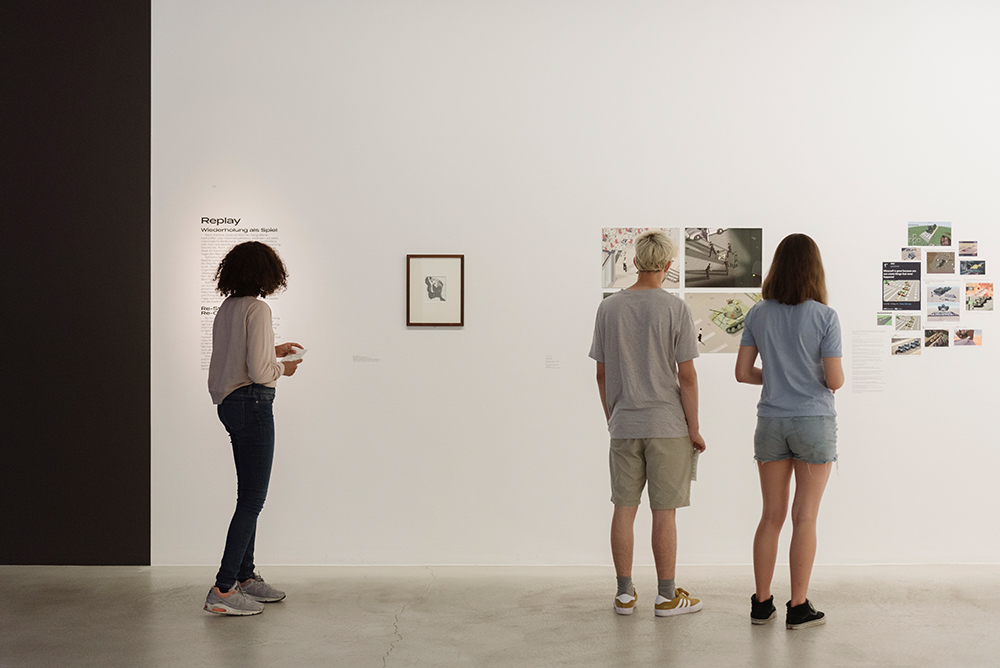
Exhibition Workshops
The workshops starts with a guided tour through the exhibition. In the second part the students have the opportunity to create their own work experimenting with different techniques. In 2025, workshops will be offered for the following exhibitions: The Lure of the Image and Poulomi Basu – Phantasmagoria.
More Information
Levels: from 5th grade / upper secondary level / supplementary school care
Language: German
For more detailed information, please consult the German-language version of this page.
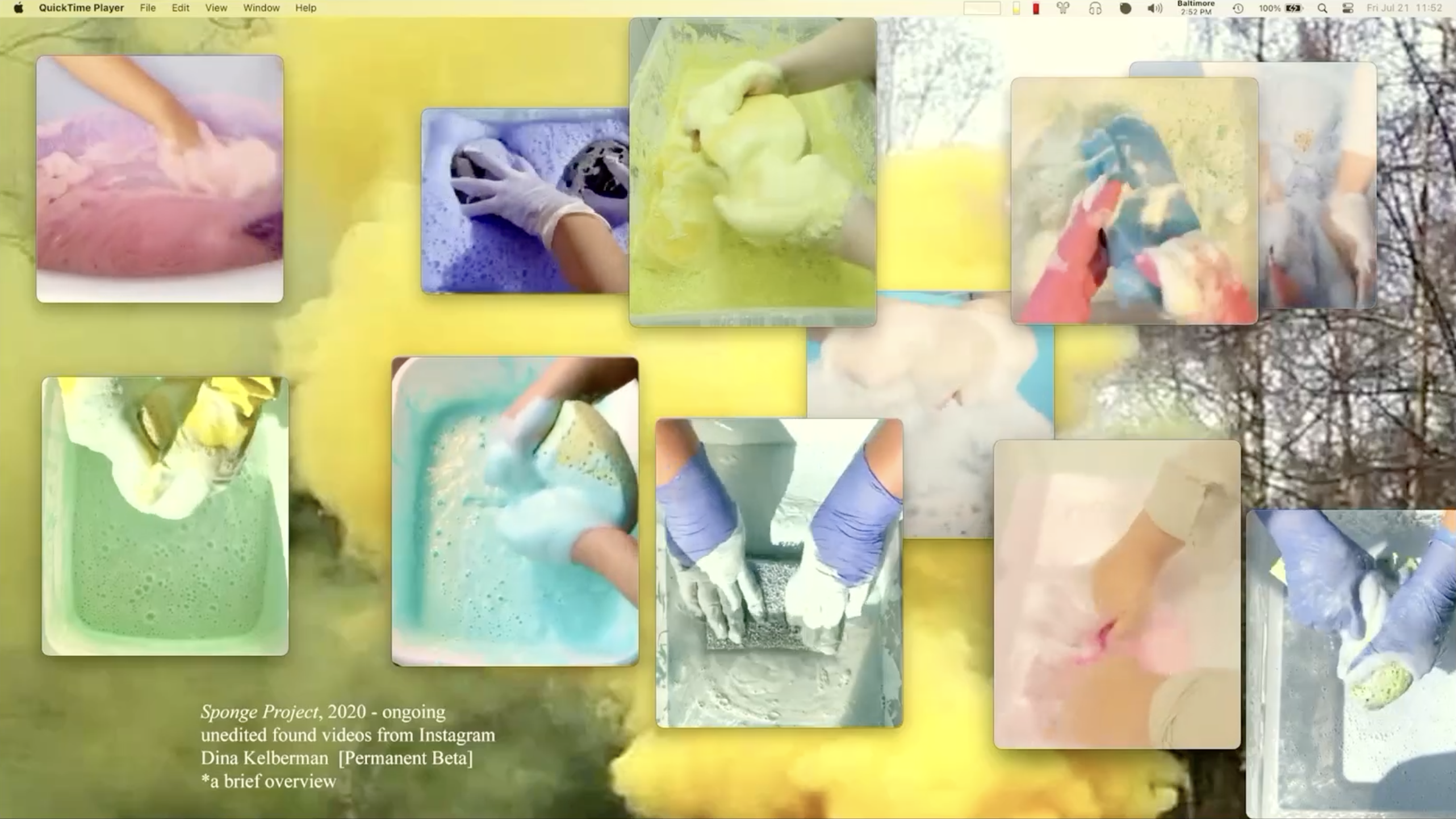
Workshop: The Lure of the Image – Can you resist the seduction of the world of digital images?
This workshop will take place in German. For more detailed information, please consult the German-language version of this page.
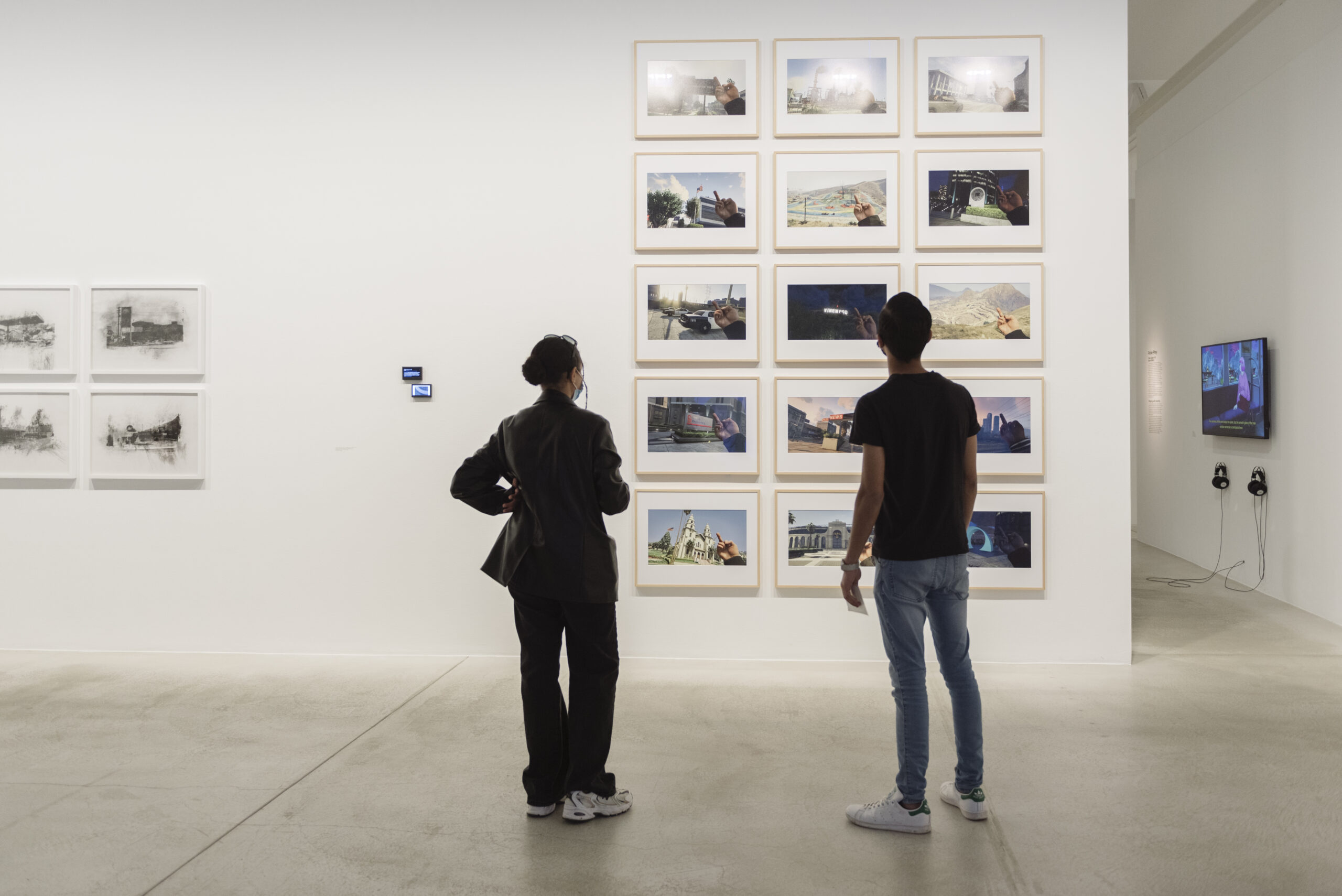
Dialogue-based guided tours
Dialogue-based guided tours for school classes convey the current exhibitions at Fotomuseum Winterthur in an interactive and level-appropriate way. The focus of the discursive format is not on imparting knowledge in a lecture-style manner, but rather on dialogue and the exchange of ideas among the pupils and students. Selected content and works from the exhibitions are discussed and the participants become acquainted with methods of image analysis.
In 2025, dialogue-based guided tours will be offered for the following exhibitions: The Lure of the Image and Poulomi Basu – Phantasmagoria.
More Information
Levels: lower and upper secondary level
Language: German
For more detailed information, please consult the German-language version of this page.
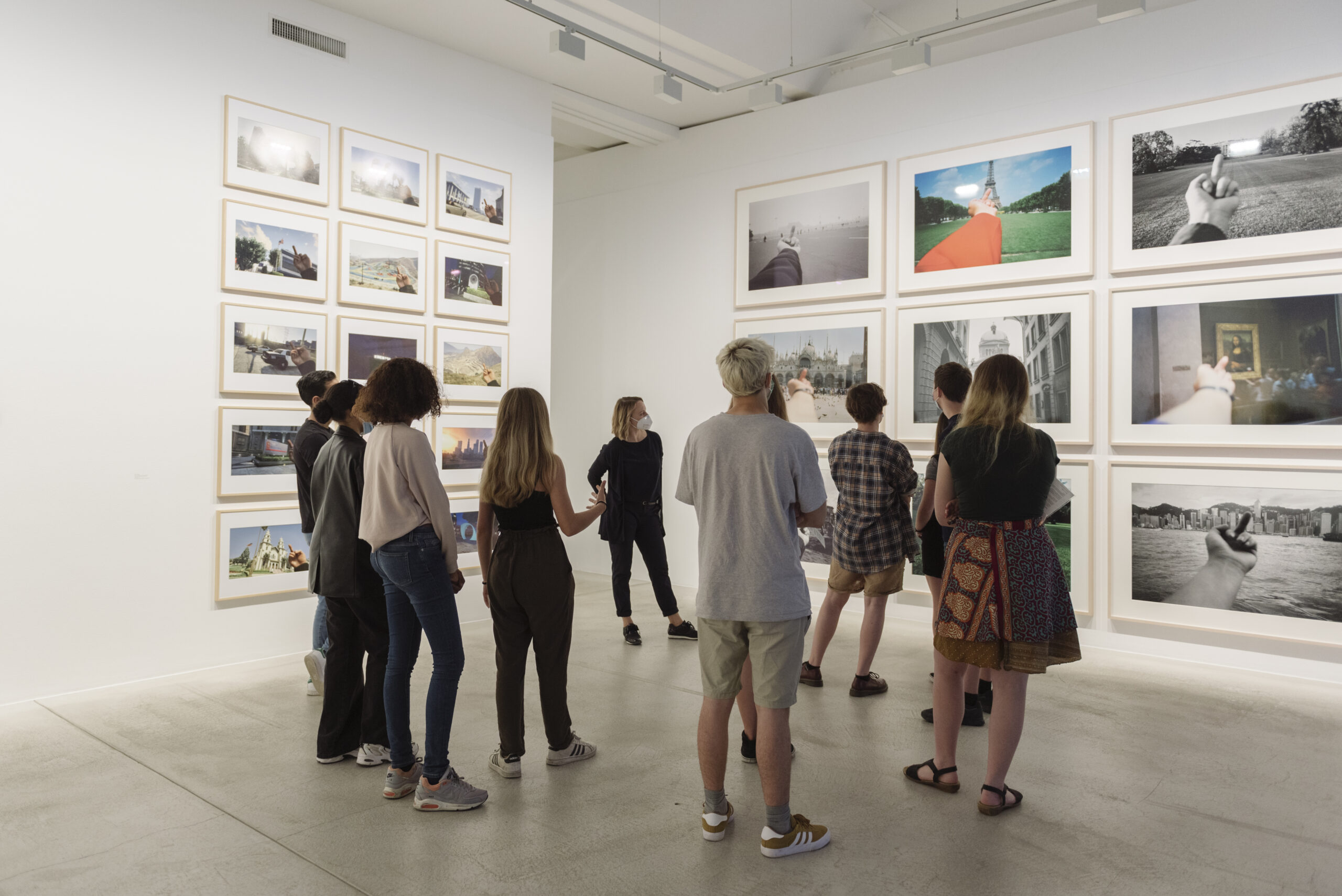
Classic Guided Tours
Fotomuseum Winterthur also offers classic guided tours of all exhibitions. The guided tours provide a comprehensive insight into the exhibitions and the works on display and impart specialist and background knowledge. They are designed for adults but can also be booked by school classes.
More Information
Language: German, English, French
Duration: 1 hour
Costs: CHF 170.– (Ger.), CHF 190.– (Fr./Eng.), max. 20–25 persons, plus reduced admission of CHF 4.– per person (admission to the exhibition is free for classes and student groups from the canton of Zurich)
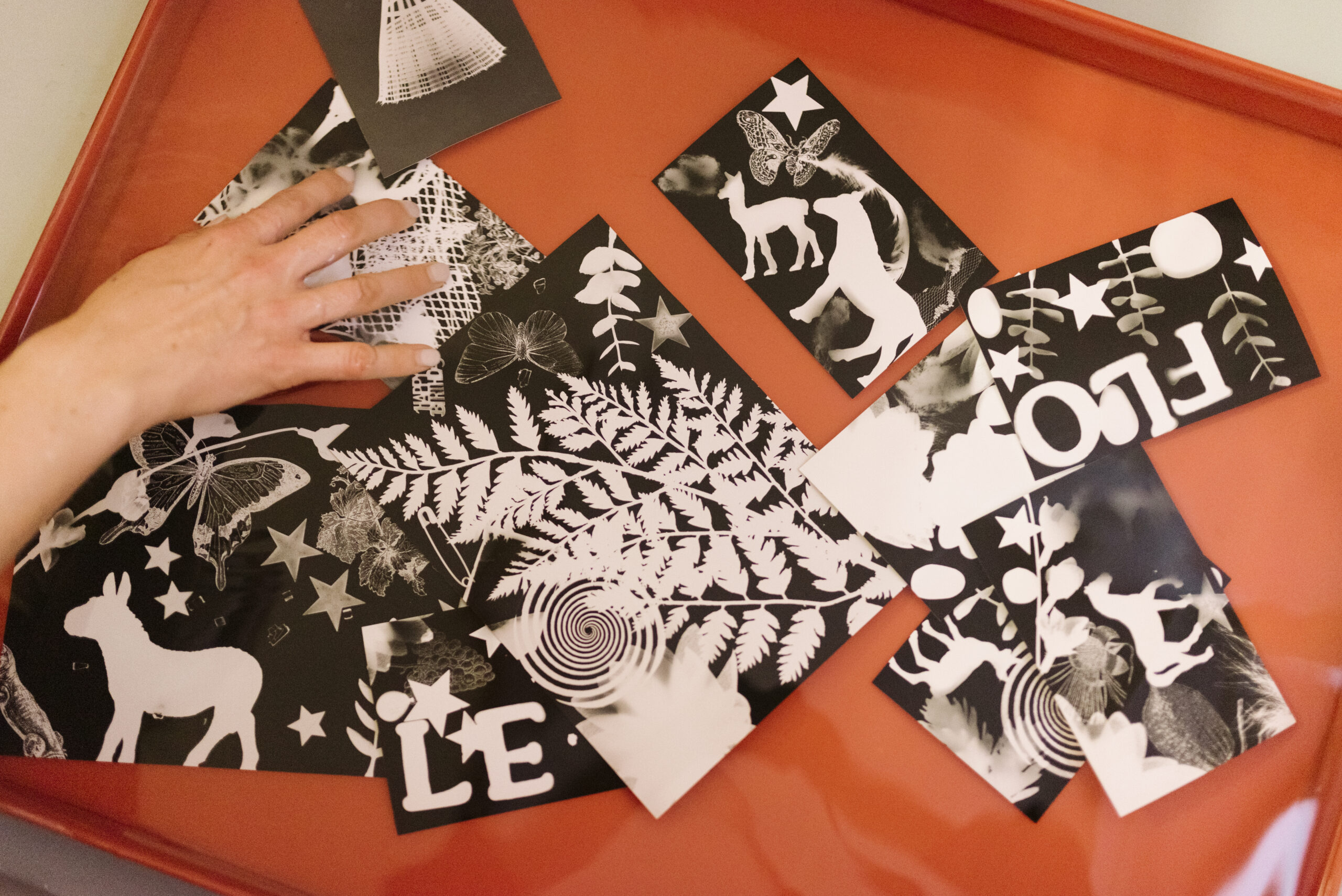
Workshop: Photogram – Creating with Light
Photographic images can be produced without a camera: light, photosensitive paper and plenty of creative energy are the only ingredients we need. The diversity of the results is all the more astonishing: shadow plays, light reflections and multiple overlays produce magical light drawings that awaken our imagination and our exploratory desire. In the workshop the pupils learn about the most important milestones in the history of photography, are introduced to the basics of photo lab technology and try their hand at image composition. Spatial constraints in the photo lab mean that the number of participants is limited to a maximum of ten pupils.
More Information
Levels: all school levels
Language: German
For more detailed information, please consult the German-language version of this page.
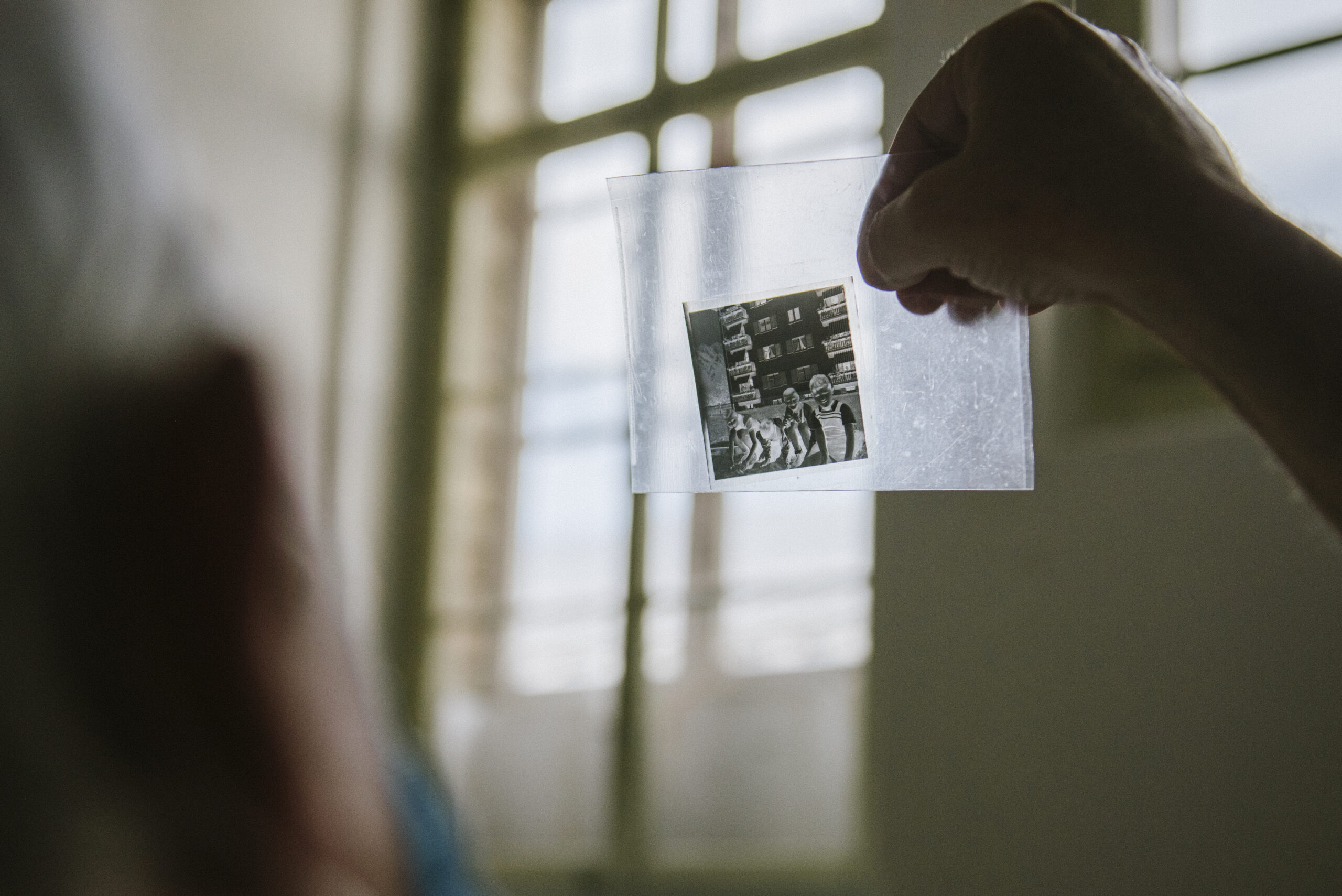
Workshop: Camera Obscura – Back to the Origins of Photography
The camera obscura, also known as ‘dark chamber’ or ‘mysterious room’, is a precursor of today’s photo cameras. In this workshop we enter a life-size camera obscura and familiarise ourselves with the origins and principles of analogue photography. These principles can then be put into practice as we take our own photographs and experiment with a pinhole camera. In the process, you will find out how factors like light, time, space and material affect an image. We then develop our motif in the photo lab; a unique original that you can take home with you. In the workshop, the pupils are introduced to the history of photography, given a more in-depth look at the basics of photo lab technology and create their own analogue photographs with a biscuit tin. Spatial constraints in the photo lab mean that the number of participants is limited to a maximum of ten pupils.
More Information
Levels: all school levels
Language: German
For more detailed information, please consult the German-language version of this page.
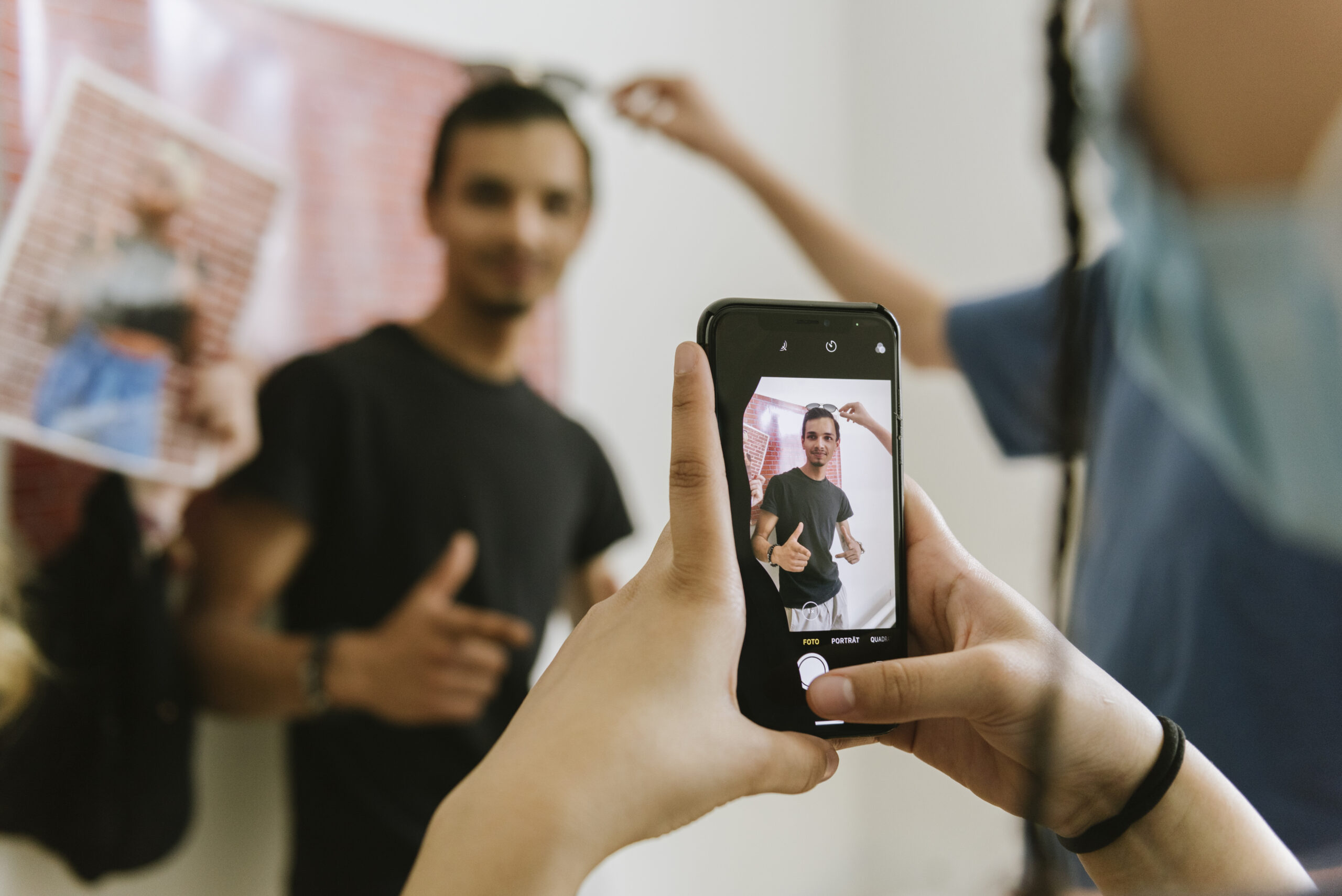
Workshop: Copy & Pose
Photographic images now offer a whole range of options for self-presentation – with just a few clicks a selfie can be taken, edited, and then shared and circulated on social networking platforms like Instagram. The workshop will focus on the opportunities and challenges intrinsic to the act of (self-)presentation: What freedom are we afforded by digital media? How far are influencers – or we, for that matter – prepared to go to obtain the perfect, self-optimised image? In the practical part of the workshop we will take a playful approach to images drawn from the realms of art, pop culture and daily life that deal with societal norms and the role of influencers. How do images shape our perception and sense of self? As they explore the fluid boundaries between photo editing and digital fiction, the participants learn strategies for critically responding to images on the net.
More Information
For more detailed information, please consult the German-language version of this page.
Supported by
The continuation and ongoing development of this offering under the title Get the Full Picture is supported by Stiftung Mercator Schweiz and Volkart Stiftung (2022–2024). This offering was originally developed as part of the educational project From Print to Pixel, which was made possible by the Migros Pioneer Fund (2019–2022).
Workshop: Tracking My Data
We all know that the moment we start browsing the internet, our data is collected, stored and processed. But what data trails do we leave behind when we interact with images? In the workshop we will explore the scope of this question by looking at a number of different examples: Who collects our personal data online and why? To what extent is this done? The second part of the workshop focuses on facial recognition – how it works and the (artistic) means that can be used to outwit it. Participants learn how to surf the net in an autonomous and more secure way. To achieve this, we will put together an anti-snooper kit, including concrete tips and tricks for ensuring more online protection.
More Information
Language: German
Supported by
The continuation and ongoing development of this offering under the title Get the Full Picture is supported by Stiftung Mercator Schweiz and Volkart Stiftung (2022–2024). This offering was originally developed as part of the educational project From Print to Pixel, which was made possible by the Migros Pioneer Fund (2019–2022).
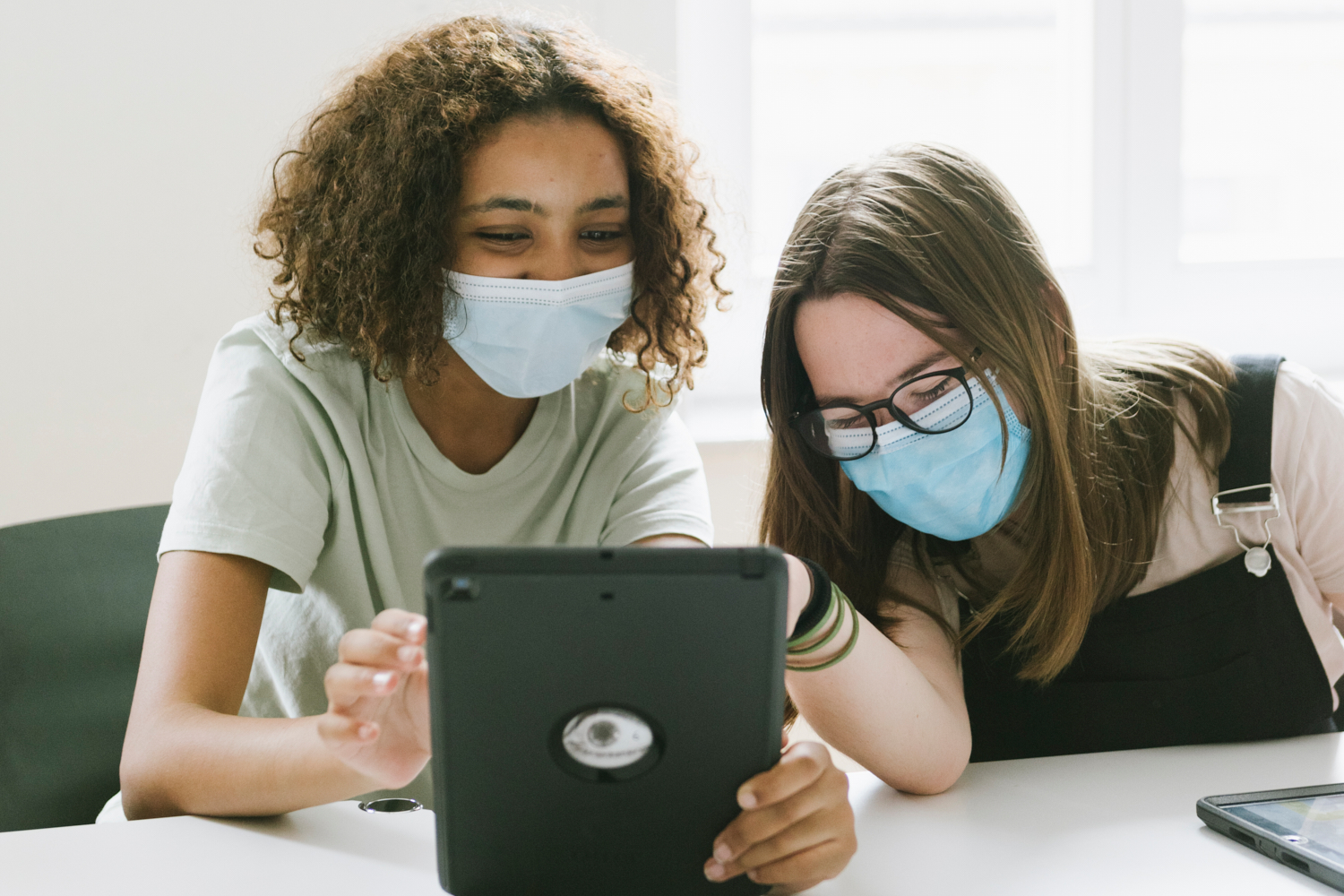
Workshop: What the Fake!?
Images can have a major influence on our process of forming (political) opinions and ultimately have an impact on our behaviour as well – they shape our understanding of the world. Looking at images critically and reading them in the specific context in which they appear is therefore an essential skill. In the workshop we will discuss the role of images in the context of disinformation: How are images manipulated? What tools do we have available to us if we want to check the veracity of images and news? Who creates fake news and why? We will use a number of different exercises to explore these questions and other related issues. We will also get to know concepts like deepfake and cheap fake and analyse the responsibility that individuals have when they share content on social media.
More Information
Language: German
Supported by
The continuation and ongoing development of this offering under the title Get the Full Picture is supported by Stiftung Mercator Schweiz and Volkart Stiftung (2022–2024). This offering was originally developed as part of the educational project From Print to Pixel, which was made possible by the Migros Pioneer Fund (2019–2022).
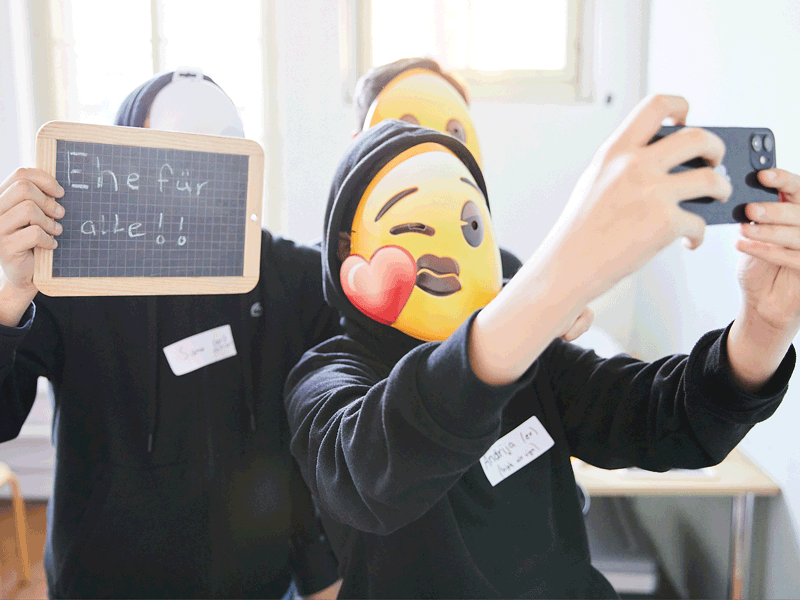
Workshop: The Internet in Your Hand
This workshop provides critical insights into the different requirements and conditions governing our internet usage. Among other things, it shows how online images leave both a digital and an ecological footprint. The internet is neither immaterial – exempt from the mechanisms of value creation – nor equally easy for everyone to access. Our photos, clicks and attention are used as a means to generate capital on social media. Meanwhile, our feeds are purged of problematic or unwanted visual content by algorithms and a human workforce. Social platforms are not necessarily transparent about the rules they play by. How is it possible to counter these systems and lodge a (visual) protest? Drawing on artistic means and examples of internet activism, the students playfully develop their own expressive visual statement fostering an independent approach to dealing with online images.
More Information
Language: German
Supported by
The continuation and ongoing development of this offering under the title Get the Full Picture is supported by Stiftung Mercator Schweiz and Volkart Stiftung (2022–2024). This offering was originally developed as part of the educational project From Print to Pixel, which was made possible by the Migros Pioneer Fund (2019–2022).

Workshop for Teachers: Pics Or It Didn’t Happen – Photography and Social Media
Fotomuseum Winterthur offers a workshop for teachers in the area of image and media competence.
More Information
Language: German
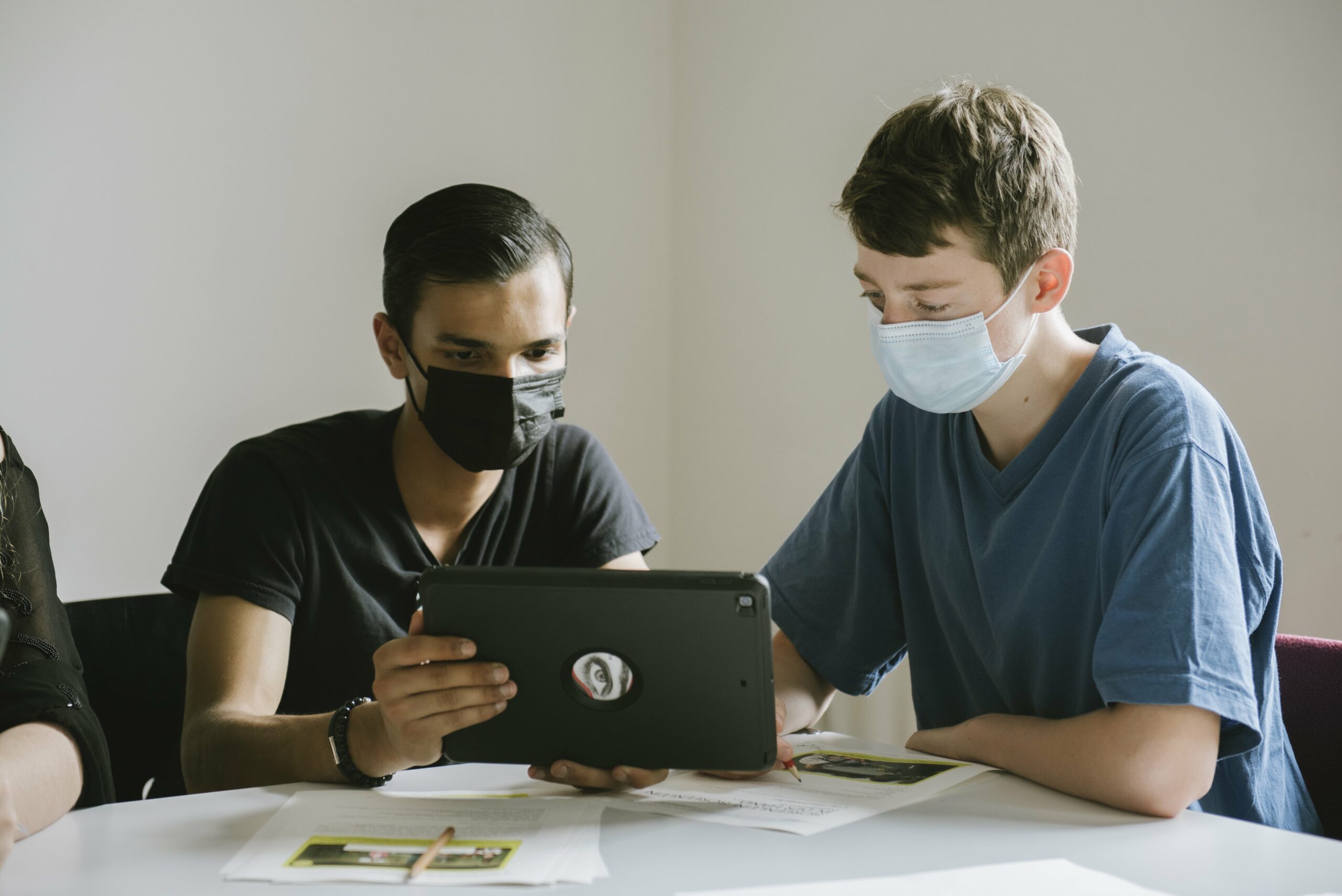
Articles
A series of articles on topics relating to image and media literacy have been created in collaboration with experts. The articles range from discussions of digital colonialism to questions of facial recognition and help readers to critically classify (digital) images.
Digital Colonialism
DIGITAL COLONIALISM IN VISUAL CULTURE
Today’s digital colonialism creates value on the basis of historical exploitation. Besides deriving profit from data, the creation of digital infrastructures also involves mining raw materials and asserting mastery over nature, the effect of which is to accentuate injustice. Images play a key role in this, albeit an ambiguous one.
BY KATRIN KÖPPERT
In the Infinite Loop
Social networking services cost nothing at first sight. However, they trade on our clicks, likes and shares: in a word, on our attention. How can we avoid being sucked in? A conversation with Safa Ghnaim from Tactical Tech.
BY GIULIA BERNARDI
Visual Fakes in the Digital Realm
VISUAL FAKES IN THE DIGITAL REALM
Images and videos are important tools for disseminating fake news – and this is by no means a recent phenomenon dating back just a few years. Unfortuna- tely, although most fakes are produced at low cost, they are nonetheless effective.
BY KAROLIN SCHWARZ
Bye, Bye Norms, Hello Empowerment!
BYE, BYE NORMS, HELLO EMPOWERMENT!
Norms and stereotypes play a delimiting role yet can be found everywhere. Even in the realm of digital self-presentation. When people who break the norms gain visibility, what effect does this have? An insightful look at the discussion on self-enactment and empowerment.
BY MARIA RUTSCHKE
Beauty Filters
BEAUTY FILTERS – WHEN BEAUTY IS STANDARDISED
It just takes a few clicks and you can fundamentally change your appearance on social media and elsewhere – using beauty filters. While, in the past, you had to hire a professional to improve the way you look in a photograph using complicated photo-editing software, today all you need is an app on your smartphone or a program on the internet. The filters that are used are geared to very strict patterns – bigger eyes, smaller nose, smooth complexion. Does this produce standardised ideals of beauty? And what does it have to do with privacy?
BY SOPHIE-CHARLOTTE OPITZ
Facial Recognition
FACIAL RECOGNITION – TECHNOLOGY BETWEEN SUPPORT AND SUPPRESSION
Why is a picture of a face scanned by a machine and what is this then
used for? How safe is this technology in terms of data transfer and identity theft? Facial recognition is a procedure that can help in the solving and prevention of crime. It can verify the identity of people in order to give them access to sensitive data and secured areas. Yet it can also be used in forms of surveillance that restrict human freedom of movement and action. An overview of the opportunities presented by digital facial recognition and the dangers that go with it.
BY SOPHIE-CHARLOTTE OPITZ AND JANA HONEGGER

Facial Recognition
What can machines read in our faces and what is this information used for? These are the kinds of questions explored in the comprehensive package of teaching material on facial recognition. Drawing on examples derived from everyday situations and contemporary artistic practice, the students are encouraged to critically examine their own image production and the technology of facial recognition. Today, this technology has already found its way into many areas of our lives – from unlocking our smartphones and applying Snapchat filters to using the automated passport control at the airport – and is tied up with a number of moral, legal and social questions.
Levels: secondary I and II / ages 12+
Content: teacher preparation material and a planning grid (three double lessons) as well as interactive worksheets for students
Supported by
The continuation and ongoing development of this offering under the title Get the Full Picture is supported by Stiftung Mercator Schweiz and Volkart Stiftung (2022–2024). This offering was originally developed as part of the educational project From Print to Pixel, which was made possible by the Migros Pioneer Fund (2019–2022).

Self-Presentation
How does self-presentation manifest online? How does it relate not only to stereotypes, ideals and power but also to algorithms? These are the kinds of questions explored in the comprehensive package of teaching material on self-presentation. Students develop an understanding of the idea of self-presentation in all its many forms. Examples drawn from the realms of art, social media and pop culture enable them to discuss stereotypes and build up a critical attitude to clichés and body shaming. Students will also look at the role of algorithms and eye tracking. This will be accompanied by discussions of image-related questions and social issues and the fostering of an autonomous approach to our networked images.
Levels: secondary I and II / ages 12+
Content: teacher preparation material and a planning grid (three double lessons) as well as interactive worksheets for students
Supported by
The continuation and ongoing development of this offering under the title Get the Full Picture is supported by Stiftung Mercator Schweiz and Volkart Stiftung (2022–2024). This offering was originally developed as part of the educational project From Print to Pixel, which was made possible by the Migros Pioneer Fund (2019–2022).
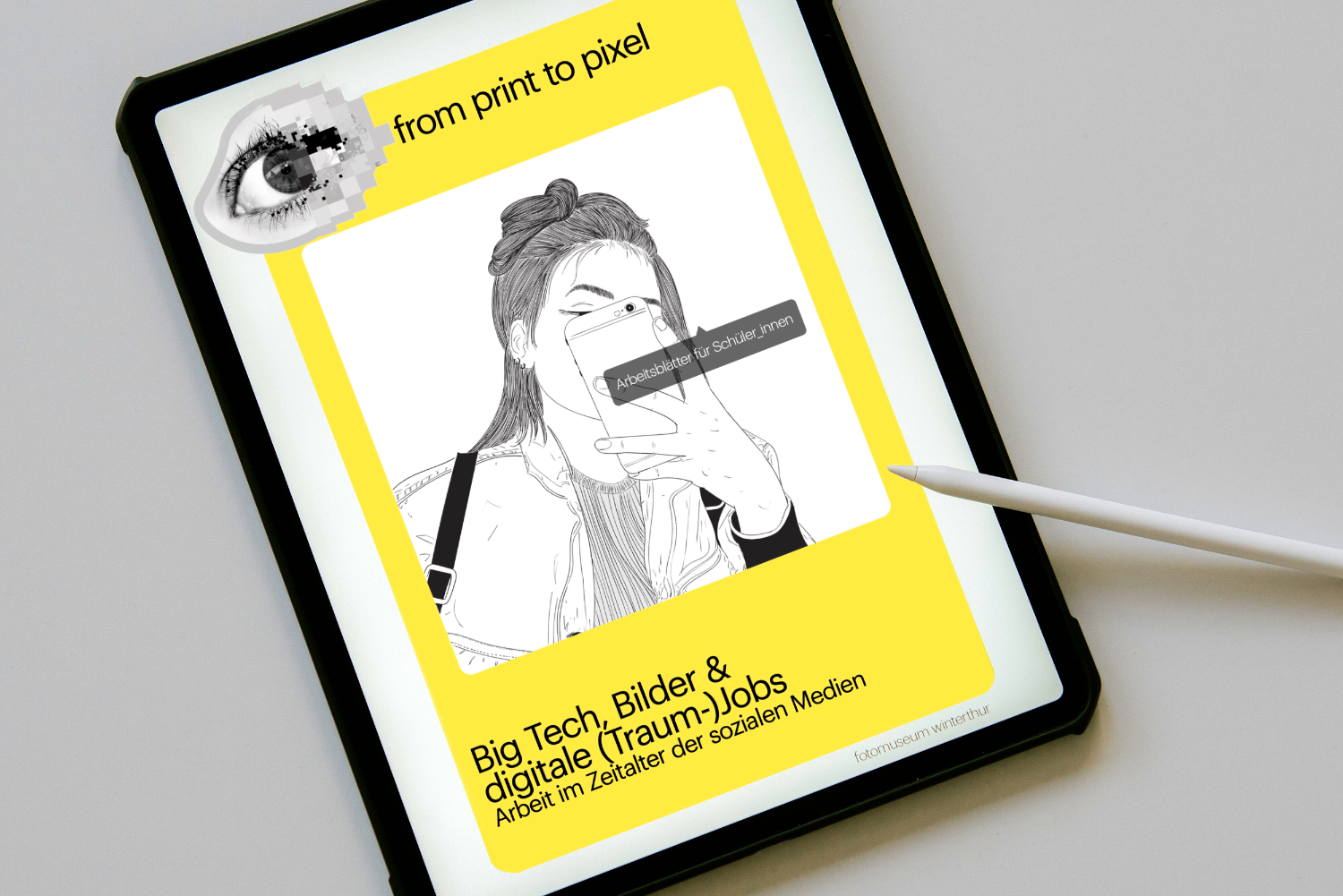
Big Tech, Images & Digital (Dream) Jobs
Is being a content creator a job? Who keeps our social media feed ‘clean’? These are the kinds of questions explored in the comprehensive package of teaching material on digital (dream) jobs. Questions relating to digital work, algorithms and Big Tech will be examined in the light of examples drawn from everyday life, art and journalism. A further focus is on our role as users and our attention, which is key to the profit harvested from and with social platforms. Facilitated by playful approaches and active class involvement, students are afforded a critical look behind the scenes of social media.
Levels: secondary I and II / ages 15+
Content: teacher preparation material and a planning grid (three double lessons) as well as interactive worksheets for students
Supported by
The continuation and ongoing development of this offering under the title Get the Full Picture is supported by Stiftung Mercator Schweiz and Volkart Stiftung (2022–2024). This offering was originally developed as part of the educational project From Print to Pixel, which was made possible by the Migros Pioneer Fund (2019–2022).
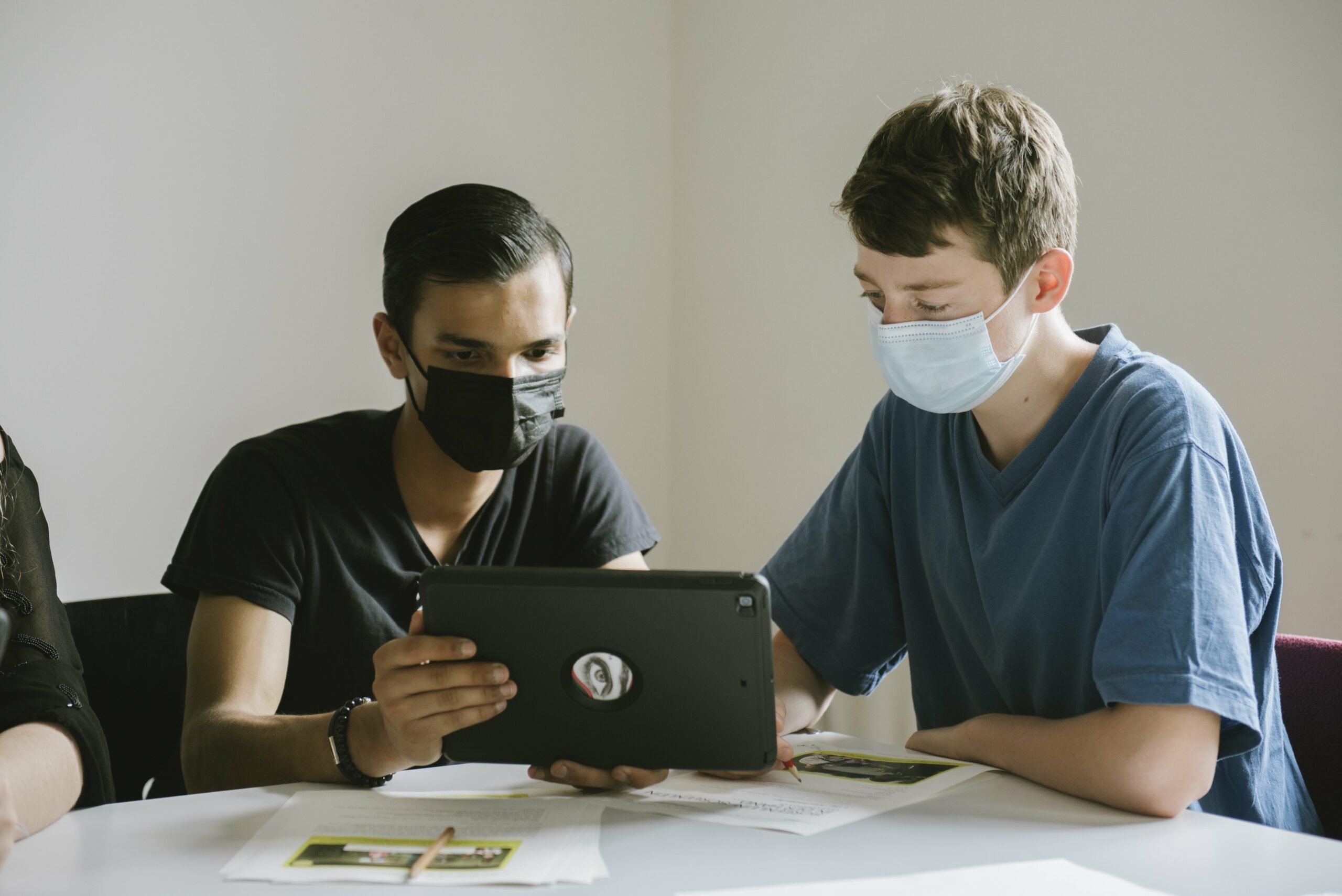
A series of articles on topics relating to image and media literacy have been created in collaboration with experts. The articles range from discussions of digital colonialism to questions of facial recognition and help readers to critically classify (digital) images.
Digital Colonialism
DIGITAL COLONIALISM IN VISUAL CULTURE
Today’s digital colonialism creates value on the basis of historical exploitation. Besides deriving profit from data, the creation of digital infrastructures also involves mining raw materials and asserting mastery over nature, the effect of which is to accentuate injustice. Images play a key role in this, albeit an ambiguous one.
BY KATRIN KÖPPERT
In the Infinite Loop
Social networking services cost nothing at first sight. However, they trade on our clicks, likes and shares: in a word, on our attention. How can we avoid being sucked in? A conversation with Safa Ghnaim from Tactical Tech.
BY GIULIA BERNARDI
Visual Fakes in the Digital Realm
VISUAL FAKES IN THE DIGITAL REALM
Images and videos are important tools for disseminating fake news – and this is by no means a recent phenomenon dating back just a few years. Unfortuna- tely, although most fakes are produced at low cost, they are nonetheless effective.
BY KAROLIN SCHWARZ
Bye, Bye Norms, Hello Empowerment!
BYE, BYE NORMS, HELLO EMPOWERMENT!
Norms and stereotypes play a delimiting role yet can be found everywhere. Even in the realm of digital self-presentation. When people who break the norms gain visibility, what effect does this have? An insightful look at the discussion on self-enactment and empowerment.
BY MARIA RUTSCHKE
Beauty Filters
BEAUTY FILTERS – WHEN BEAUTY IS STANDARDISED
It just takes a few clicks and you can fundamentally change your appearance on social media and elsewhere – using beauty filters. While, in the past, you had to hire a professional to improve the way you look in a photograph using complicated photo-editing software, today all you need is an app on your smartphone or a program on the internet. The filters that are used are geared to very strict patterns – bigger eyes, smaller nose, smooth complexion. Does this produce standardised ideals of beauty? And what does it have to do with privacy?
BY SOPHIE-CHARLOTTE OPITZ
Facial Recognition
FACIAL RECOGNITION – TECHNOLOGY BETWEEN SUPPORT AND SUPPRESSION
Why is a picture of a face scanned by a machine and what is this then
used for? How safe is this technology in terms of data transfer and identity theft? Facial recognition is a procedure that can help in the solving and prevention of crime. It can verify the identity of people in order to give them access to sensitive data and secured areas. Yet it can also be used in forms of surveillance that restrict human freedom of movement and action. An overview of the opportunities presented by digital facial recognition and the dangers that go with it.
BY SOPHIE-CHARLOTTE OPITZ AND JANA HONEGGER